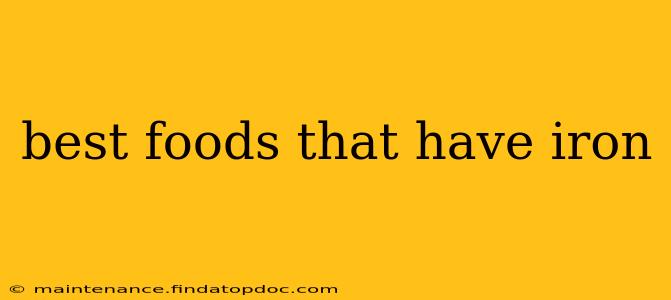Iron is a crucial mineral for our bodies, playing a vital role in carrying oxygen throughout the bloodstream and supporting energy levels. Iron deficiency, or anemia, is surprisingly common and can lead to fatigue, weakness, and other health problems. Fortunately, incorporating iron-rich foods into your diet is an effective way to boost your levels naturally. This comprehensive guide explores some of the best sources of iron, delving into their nutritional benefits and offering tips for maximizing iron absorption.
What are the best sources of iron?
Many foods contain iron, but some stand out as particularly rich sources. These can be broadly categorized into heme and non-heme iron sources. Heme iron, found in animal products, is more easily absorbed than non-heme iron, found in plant-based foods.
Top Heme Iron Sources:
- Red Meat: Lean cuts of beef, lamb, and pork are excellent sources of heme iron. A 3-ounce serving of lean beef can provide a significant portion of your daily iron needs.
- Organ Meats: Liver, kidney, and heart are exceptionally high in iron, but should be consumed in moderation due to their high cholesterol content.
- Poultry: Dark meat chicken and turkey contain more iron than their white meat counterparts.
- Seafood: Clams, oysters, and mussels are among the best seafood sources of iron.
Top Non-Heme Iron Sources:
- Lentils: These legumes are a nutritional powerhouse, offering a substantial amount of iron along with fiber and protein.
- Spinach: This leafy green vegetable is a popular and readily available source of non-heme iron.
- Beans: Kidney beans, black beans, and chickpeas are all excellent sources of iron, contributing to both iron and fiber intake.
- Tofu: A versatile soy product, tofu offers a good source of iron, especially for vegetarians and vegans.
- Fortified Cereals: Many breakfast cereals are fortified with iron to enhance their nutritional profile. Always check the nutrition label.
- Dried Fruits: Raisins, apricots, and prunes are good sources of iron, but remember to watch added sugar content.
What foods help you absorb iron better?
The absorption of iron can be influenced by various factors. Pairing iron-rich foods with foods containing vitamin C significantly improves absorption.
Foods that enhance iron absorption:
- Citrus Fruits: Oranges, grapefruits, and lemons are excellent sources of vitamin C, greatly increasing non-heme iron absorption.
- Strawberries: These berries are another good source of vitamin C, boosting iron uptake.
- Bell Peppers: Both red and green bell peppers contain vitamin C, which helps the body absorb more iron.
What are some iron-rich vegetarian and vegan options?
Many delicious and nutritious vegetarian and vegan options provide ample iron. The key is to combine iron-rich plant-based foods with vitamin C-rich foods to maximize absorption.
- Lentil Soup with Lemon: A hearty and flavorful soup combining lentils (iron) and lemon juice (vitamin C) is an excellent choice.
- Spinach and Strawberry Salad with a Citrus Vinaigrette: This salad combines spinach (iron) and strawberries (vitamin C) for enhanced absorption.
- Tofu Scramble with Bell Peppers: A quick and easy breakfast or lunch option, combining tofu (iron) with bell peppers (vitamin C).
Are there any foods that inhibit iron absorption?
Certain substances can interfere with iron absorption, reducing the amount your body can utilize.
Foods that hinder iron absorption:
- Phytates: Found in grains, legumes, and nuts, phytates can bind to iron, making it less absorbable. Soaking or sprouting grains and legumes can reduce phytate levels.
- Tannins: Present in tea and coffee, tannins can also inhibit iron absorption. It’s best to avoid consuming these beverages immediately before or after meals containing iron.
- Calcium: Excessive calcium intake can compete with iron absorption. While calcium is essential, ensuring a balanced intake is crucial.
How much iron do I need per day?
The recommended daily allowance of iron varies depending on age, sex, and overall health. It's always best to consult with a doctor or registered dietitian to determine your individual needs. They can assess your current iron levels and advise you on appropriate dietary strategies.
What are the symptoms of iron deficiency?
Iron deficiency can manifest in various ways, ranging from mild fatigue to more serious health problems. Common symptoms include fatigue, weakness, pale skin, shortness of breath, headache, dizziness, and cold hands and feet. If you experience any of these symptoms, it's essential to consult a healthcare professional for proper diagnosis and treatment.
This comprehensive guide highlights the best foods that have iron, offering valuable information on maximizing absorption and understanding potential inhibitors. Remember, incorporating a variety of iron-rich foods into a balanced diet is crucial for maintaining optimal health and energy levels. Always consult a healthcare professional if you have concerns about your iron levels or suspect iron deficiency.
